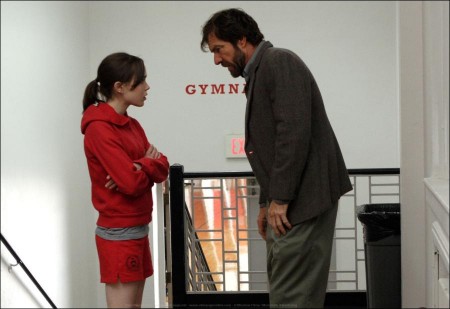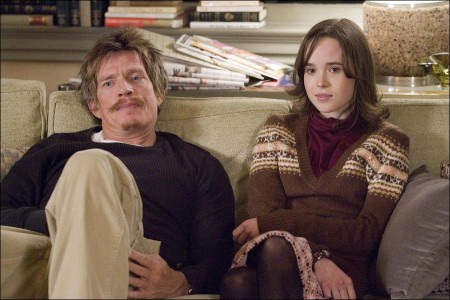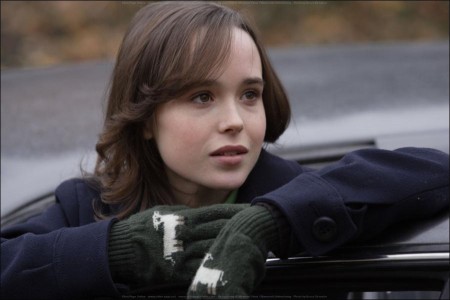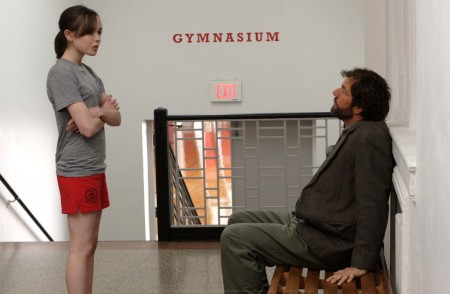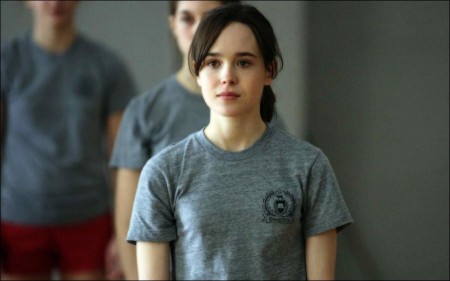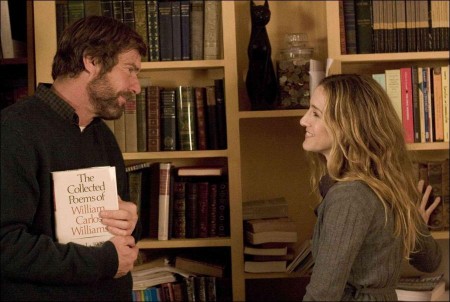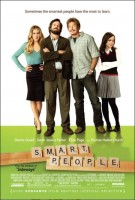Tagline: Sometimes the smartest people have the most to learn.
Lawrence Wethrehold is a widowed, acerbic and self-absorbed literature professor who has alienated his son and turned his daughter into an overachieving, friendless teen. He falls for Janet, one of his former students, while at the same time his ne’er-do-well brother unexpectedly shows up at this door, triggering in him the need to change and reconnect with his family before he can make any steps forward in his life.
Professor Lawrence Wetherhold (Dennis Quaid) might be imperiously brilliant, monumentally self-possessed and an intellectual giant – but when it comes to solving the conundrums of love and family, he’s as downright flummoxed as the next guy. His collegiate son (Ashton Holmes) won’t confide in him, his teenaged daughter (Ellen Page) is an acid-tongued overachiever who follows all too closely in dad’s misery-loving footsteps, and his adopted, preposterously ne’er-do-well brother (Thomas Haden Church) has perfected the art of freeloading.
A widower who can’t seem to find passion in anything anymore, not even the Victorian Literature in which he’s an expert, it seems Lawrence is sleepwalking through a very stunted middle age. When his brother shows up for an extended stay at just about the same time as he accidentally encounters his former student Janet (Sarah Jessica Parker), the circumstances cause him to stir from his deep, deep freeze, with often comical, sometimes heartbreaking, consequences for himself and everyone around him.
About The Genesis of Smart People
SMART PEOPLE is the story of an entire family coming-of-age, kicking and screaming the whole way. The head of the family, Lawrence Wetherhold, is having a colossal mid-life crisis. He’s a venerable professor who can’t connect with his students, a brilliant writer who can’t publish his book, an aloof father who can’t comprehend his equally smart children and a lonesome widower who can no longer remember the details of how love works.
Things are at a standstill in the Wetherhold household… until two events shatter the angstridden peace and change everything. First, Lawrence’s adopted brother Chuck – a perpetual, overgrown adolescent – comes back into his life, looking for a place to crash while he gets his life together for the thousandth time. And then, against all odds, Lawrence does the unthinkable: he falls in love. As chaos breaks out on all fronts, Lawrence’s brainy, blustering, well-armored defenses also began to break down – confronting him with the grouchy shadow of a man he has become and the parent, teacher and lover he once wanted to be.
The story of the Wetherholds first came to life in the mind of Mark Poirier, an acclaimed young American novelist and short story writer who is just starting to break into screenwriting. Poirier’s two critically praised novels, Goats and Modern Ranch Living, explored the humor and anguish hiding within the surreal fabric of modern life in the Southwestern U.S.
But with SMART PEOPLE, Poirier wanted to delve into another insular, quirk-filled world with which he is quite familiar: academia. (Poirier has both attended and taught writing at Bennington College, Johns Hopkins University and Stanford, among others.) It’s a realm that has been satirized and dissected in various ways throughout movie history – but Poirier was interested a different aspect of the academic universe: its family life and the volatile emotions and darkly funny situations that often hide behind the overblown self-importance and heady anxieties of the intellectual world. In the intellectually gifted Wetherholds he perceived a family at once funny and moving in their predicament of knowing so much – yet not really knowing one another at all.
The characters also cut close to the bone for Poirier. “When I was a kid, people used to call me `Old Man,’ because I was very sort of grouchy and unhappy and a lot like Lawrence,” he explains. “Vanessa, his daughter, is also sort of an extreme version of who I was in high school – someone who was achieving a lot, but for all the wrong reasons. And Lawrence’s son James and brother Chuck are the people I always wished I could be, you know, to be that cool and to dare to do what you really loved.”
Poirier’s screenplay soon attracted the devoted attention of leading producers Bridget Johnson, whose films include such major critical and box-office hits as Jerry Maguire and As Good As It Gets, and Michael Costigan, who broke into producing with Brokeback Mountain and this year executive produced American Gangster. They in turn sent the script to Noam Murro, a native-born Israeli and one of the ad world’s leading lights who had cut his creative teeth on award-winning spots for such companies as Nike and Adidas, and was named DGA Director of the Year in 2005. Murro was ready to break out into feature films, and searching for a story that would hit home, when SMART PEOPLE did just that.
It was the semi-sweet mix of the sardonic and the heartbreaking in the piece that really set it apart for Murro. “I liked that it was about very serious themes, yet it addressed them very unassumingly,” he continues.
“There’s a wonderful poignancy to these characters, but at the same time they can be painfully funny. It’s a story that invites you in without feeling too heavy. Although it’s about a family that never really woke up from grief, the story doesn’t take itself too seriously and, therefore, I think it allows you to get closer to some kind of truth. These aren’t perfect characters – they’re all quite damaged in various ways, but for me, that was a great place to start.”
Early meetings confirmed that Murro and the producers were on the same page. “Noam is extremely focused and really knows his own mind,” says Bridget Johnson. “We were always very confident that he would bring a unique visual style to the film, and that he would be great with the characters and the actors.”
Meanwhile, Mark Poirier was equally thrilled to hear that Murro was going to helm his story, having already encountered his work. “When I was teaching at Bennington College, I taught a course called `The Short Short Story’ and we looked at some of Noam’s ads and discussed how they are really like short films,” he recalls. “Now, I was very excited to be working with him.”
Murro and Poirier spent the next twelve months intensively collaborating on a new draft of the script, finding a very strong creative rapport. Meanwhile, Bruna Papandrea and Michael London of Groundswell Productions came on board. London, who had previously brought Rex Pickett’s novel Sideways to the screen in an Oscar-nominated production directed by Alexander Payne and who also produced the family-angst comedy The Family Stone, immediately responded to the story.
“It had all the elements that attract me – films about families and real people, that are both funny and sad,” he comments. “Right away, I was sold on the script and on Noam. Watching his ad work, I could see straight away that he had his own voice and sensibility. His work was funny, human and interesting, all the qualities needed for SMART PEOPLE.”
London continues: “Michael and Bridget had spent years giving birth to this project and we found ourselves in the luxurious position of receiving it. I loved the script and the director and now it was a matter of getting the right cast together.”
Playing Smart
The casting of Lawrence Wetherhold was so key to SMART PEOPLE that it happened early on, while it was still in the earliest stages of development. It was always clear that the character Mark Poirier had so carefully crafted would require an actor of great versatility, as well as courage. After all, Wetherhold is not an easy man in any sense of the word. He can be devastatingly bright or overwhelmingly bitter, haughtily self-important or deeply vulnerable, an unapologetic curmudgeon or a fragile man in need of love- no easy group of characteristics to explore in a singular performance rife with both comedy and poignancy. But when Dennis Quaid’s name came up, everyone was intrigued by the idea, including Quaid.
Quaid’s roles have truly run the gamut — from a high school baseball coach in The Rookie to a high-powered attorney in Traffic to a 1950s husband hiding his homosexuality in Far From Heaven to an out-of-touch United States President in the comedy American Dreamz.
Yet, Lawrence Wetherhold was like no role he’d done before. And, despite his rather towering set of flaws, Quaid was rather touched by him. “He’s a true curmudgeon and a grouch,” Quaid readily admits. “But he’s also someone who’s really dead inside at the beginning of the story. He might be extremely intelligent by his own account, and by others, but at the same time, he’s an emotional idiot. He doesn’t know how to just live life, how to embrace life.”
“Lawrence is someone very different from myself, except for the grouch part,” Quaid jokes. “He’s very sedentary and lives entirely in his head and I’m much more of an extrovert, so it was hard at first to envision myself in the role. But the story was so good and that’s what really attracted me. It’s a very human comedy and it got to me.”
When Quaid later met with director Noam Murro, the actor still wasn’t quite sure if he was right for the role, but their conversation sparked his interest even more. “I listened to Noam’s ideas and they intrigued me. He really knows a lot about human behavior and in talking to him I started to think about how sometimes people do have very inappropriate reactions to life and I decided I wanted to explore that through Lawrence and not be at all conventional,” he explains.
Delving into both the humor and the heartache of Wetherhold’s emotional disasters ultimately became the M.O. of Quaid’s performance. His preparation included gaining 25 pounds to mirror Lawrence’s lumpy, gone-to-pot physique and even giving up smoking just prior to production so that he would arrive on the set as irritable and edgy as possible!
Once the character began to come to life on the set, the filmmakers were amazed that Quaid had ever balked at the role. “I thought it was really perfect casting,” says Michael London. “We could have cast a sort of obvious East Coast, Ivy League, snobby type but that would have been a lot less interesting because we’ve seen that so many times before. Instead, Dennis brings something new, a more populist American presence that broadens the scope of the film.”
Family Smarts
If Lawrence Wetherhold has a hard time relating to his students, he’s even more bamboozled when it comes to fatherhood and family. To make matters even more complicated, he’s just received another “surprise” visit from his slacker brother, Chuck, whom Lawrence makes a point of reminding everyone, especially Chuck, was adopted. The two couldn’t be more different – where Lawrence is pompous, uptight and officiously responsible, Chuck is a laid back, pleasure-seeking, unabashed flake – and yet they must come to rely deeply on one another.
To bring out the humor and unexpected humanity in a grown man who lives his life like a child, Michael London immediately thought of Thomas Haden Church, with whom he had worked on Sideways in a serio-comic role that garnered Church an Academy Award® nomination. “I was hearing Thomas’s voice in the role of Chuck the minute I began reading the script,” recalls London. “It turned out that Noam was equally excited and receptive to the idea.”
Church was lured in by the script. “I thought it was, well, very smart. I really liked the style and the story,” he says. “And I liked the way the character of Chuck evolved. He seems like this clueless, hapless bohemian, but then, as with Lawrence, you start to see the layers stripped off.”
The more he got to know Chuck, the more he began to see who he is and why this lackadaisical free spirit manages to spur changes in those around him. “What I like about Chuck is that he’s got nothing to hide, there’s no duplicity. He has a candor that I think the rest of the family are largely avoiding, and really needs,” Church explains.
Dennis Quaid notes that Church’s performance struck close to the bone for him. “He reminded me a little of my own little brother, and just the way brothers are in general, the way they can get under your skin and annoy you – yet how much they also make you laugh,” he explains. “Thomas is very creative and improvisational – I’d love to work with him again on anything.”
Unexpectedly, Chuck forms the closest bond in the Wetherhold family with his unusual niece, Vanessa, a prim and proper Young Republican who uses her lashing wit to withering effect. Vanessa may be a stunning master of extra-curricular activities and high test scores but when it comes to making even a single friend, she’s been a disheartening failure.
At once a desperately lonely, sheltered child and the whip-smart, world-weary head of her household, Vanessa turned out to be most challenging of all the roles to cast, sending the filmmakers off on a months-long search for the right young actress. “Vanessa is, for me, one of the significant chambers that pumps blood into the heart of this movie. The difficulty was in finding someone who had the spunk of a young girl who also possessing the soul of a 40 year old. That is a really complicated thing to pull off,” observes Murro.
Early on Murro thought of one actress who he thought had the right stuff for the role: Ellen Page — the young Nova Scotian who first came to the fore as a savvy teen who turns the tables on a pedophile in the indie drama Hard Candy and more recently has won hearts, accolades and awards for running away with the title role in Juno. But at first, Page was unavailable. Then, at the eleventh hour, her schedule shifted and she met with Murro. He knew instantly she was what he had been looking for all along.
He recalls: “Our meeting took place in a Burger King at Newark Airport. I came in from Pittsburgh and Ellen flew in from Canada. I saw her small figure and frame walking towards me and I just knew in that instant that she was the genius I was looking for. I feel very blessed to have had this chance to work with her.”
Page had found the Wetherhold family fascinating in Mark Porirer’s screenplay. “There’s so much passive-aggressive bitterness and child’s play in their interaction with each other. They have such a lapse in communication, and yet they all really want the same thing,” she says.
She also found a lot of empathy for what prickly, difficult Vanessa is going through. “She’s in the middle of this whole role reversal with her father, where she’s maintaining the household and doing the cooking, and all she does is clean and study and practice for her SAT’s. There’s no sense of normalcy or being a regular teenager in her life, which is what makes her such an arrogant and angry person,” she says. “I got where she’s coming from completely. It’s kind of heartbreaking, but I also believe she’ll get through it.”
Vanessa is forced into unexpected moments of fun and relaxation by her hedonistic Uncle Chuck, which results in a perilous misunderstanding between them. Page especially loved getting the chance to work so closely with Thomas Haden Church in creating their unusual, and unusually honest, rapport. “Thomas is hilarious, extremely smart and has fantastic instincts,” she says, “and he was always trying new things.”
Church was perhaps even more impressed by his young co-star. “Ellen is so gifted it’s hard to fully comprehend it,” says Church. “She has nuances to her performance that I think are very rare. I said to Dennis, `I think this must be what Leonardo DiCaprio was like as a teenager.’”
Meanwhile, for the role of Vanessa’s older brother, James, who keeps his well-adjusted life of remarkable accomplishments a secret, Noam Murro knew right off the bat who he wanted to cast: rising young star Ashton Holmes, whom David Cronenberg had cast as Viggo Mortensen’s son in A History of Violence. “When I saw `The History of Violence,’ I loved the film and I loved Ashton. I couldn’t see anyone else in this role,” says the director.
Holmes was excited to find that young James broke the mold; far from being the usual young male rebel, he is actually the one reasonably well-adjusted person in the Wetherhold family. “James is an intellectual but he doesn’t lack the emotional core that his dad lacks,” Holmes observes. “I think his mom must have given him some of that emotional fiber that he definitely didn’t get from his father.”
To navigate the tricky relationship between James and Lawrence, Holmes delved into long conversations with Dennis Quaid about the long-buried father-son bond between them. “Dennis envisioned Lawrence as someone who’s just really touchy and bitchy all the time. He’s very aloof as a dad and he isn’t as involved in his kid’s day-to-day life as a normal dad would be, but he still cares in his own way,” he says. “I was really impressed with Dennis’ commitment to that character.”
Each of the actors’ deep commitment added up to the essence of a real, complicated family of difficult but yearning individuals, notes Murro. “The key was that each of the cast really understood their characters,” he says, “and they understand that this is not one of those movies where there is a huge arc to each of them. What happens to the Wetherholds is what happens to a lot of us in real life – that is, we don’t change in really big ways.”
Smart People In Love
The crusty veneer that surrounds Lawrence Wetherhold in SMART PEOPLE begins to crack apart when he does the one thing he never expected he would ever do again – fall in love, for the first time since his wife died ten years ago. The recipient of his affection is a former student who once had a school-girl crush on him back when he was her impossible-to-please professor. But now Janet Hartigan is very much an adult, a lonely Emergency Room doctor who finds herself boggled by a man who seems to have built impenetrable steel walls around himself. Their love story – awkward, eccentric and almost over before it starts – is the stuttering engine that drives the transformation of the Wetherhold family.
Golden Globe-winner Sarah Jessica Parker took on the role of Janet much to Dennis Quaid’s delight. “I thought she was amazing,” he says, “with a character that’s very different from anyone she’s played before. As Dr. Hartigan, she’s someone who’s also emotionally closed off, although not as much as Lawrence is. They’re really two people who don’t seem to have a clue, or a chance, to pull off this relationship, and yet they do.”
Parker had previously worked with producer Michael London on The Family Stone, which led to him sending her SMART PEOPLE. “Sarah just seemed like the right color for this film,” remarks London. “I knew she was looking for something challenging, and she has a wonderful gift for prickly characters. She can make them feel real and accessible in a way few actors can.”
It was the unusual turbulence in the romance between Lawrence and Janet that first attracted Parker. “I liked that it was a real adult story about two people doing their best version of attempting a relationship – one that neither of them is really well equipped to deal with,” she says.
Working with Quaid became the icing on the cake. “He has a quality that reminds me of people who are just starting out in the movie business. He seems so fresh and delighted by things, not cynical about the process,” Parker comments. “He’s really surprising and I grew very fond of him.”
Land Of The Smart
To capture the very particular ambiance of a top shelf university, the production of SMART PEOPLE took place largely in and around the campus of Carnegie Mellon, which was recently named by Newsweek as one of the “New Ivies” and has long been one of America’s most selective leading colleges. The setting of Carnegie Mellon in Pittsburrgh, Pennsylvania was especially attractive to Michael London and Bruna Papandrea, who had developed a great affection for the Northeastern city when they shot a screen adaptation of Michael Chabon’s The Mysteries of Pittsburgh there earlier that year. London talked to Mark Poirier about incorporating the location into the screenplay, not just idly but weaving the school and the town into the very fabric of the story.
“I tend to gravitate towards movies that have a sense of place, that aren’t set in some generic `movieland,’” says London. “So it’s not just that we shot SMART PEOPLE in Pittsburgh; we reset the movie in Pittsburgh. We took Carnegie Mellon and we made Dennis’ character a teacher at Carnegie Mellon. Dennis really feels like a Pittsburgh character to me and that all becomes part of the experience.”
The filmmakers were also excited by the visual uniqueness of Pittsburgh, a city that Lawrence Wetherhold jokes is “the Paris of Western Pennsylvania.” “A great thing about shooting in Pittsburgh is that it’s a painting you haven’t seen before,” says Bruna Papandrea. “Up till now, not a lot of films have been shot here.”
Noam Murro was taken with the visual possibilities inherent to Carnegie Mellon’s campus, which sits on 140 acres about three miles outside of downtown Pittsburgh. “It’s not he traditional Ivy League campus, with red brick with ivy growing on the walls. It gave us a much fresher, more interesting look for the film,” he says. “Additionally, Carnegie has a strong English Department and is also renowned for their Drama and Engineering Departments, so that suited the storyline of SMART PEOPLE. Most of all, it felt like the University that Lawrence would teach at.”
The campus not only provided authentic locations, from offices to lecture halls, but a bevy of enthusiastic students who served as extras, production assistants and interns during the shoot. Production designer Patti Podesta, whose work has ranged from the backwards universe of Memento to recreating the Ambassador Hotel of 1968 in Bobby, worked closely with Murro to take full advantage of the rich academic atmosphere. Moving off campus, she especially enjoyed delving into the details of the Wetherholds’ on-hold lives to create their well-worn home. After scouring the city, Podesta chose a house in the area known as Friendship, drawn to its genteel neighborhood feel. Over a period of two weeks, the house was completely remodeled and refurnished in a manner befitting a family that has been stuck in a mire of grief and missed connections over the last decade. When cast and crew arrived in Pittsburgh, they hit the ground running, shooting the film in just 29 tightly scheduled days. Murro set an electrifying pace and kept things moving at a rapid-fire speed.
“Noam brought to the project an abundance of energy and was able to make very quick decisions on scenes and move through the schedule,” says Papandrea. “I worked with Sydney Pollack for years and what always amazed me was that, even though he had been making movies for 40 or 50 years, he still did it with the energy of a 30 year old. Noam has that same energy – no amount of work is too much. He has an amazing mind and it was incredible to watch him on set.”
About The Music
The final touches were added to SMART PEOPLE by composer Nuno Bettencourt, a highly regarded guitarist who makes his debut as a composer on the film. Bruna Papandrea, a friend of Bettencourt’s, had given him a copy of the film and without even being asked, Bettencourt had found himself inspired to write some music. Later, the filmmakers listened to his cues and felt instantly that this was the right musical direction for the film. “Music is your emotional bed and I always felt that at the end of the day, the score needed to echo the interior humbleness of these characters and situations,” says Noam Murro. “Nuno got that straight off the bat.”
Bettencourt found his initial inspiration in the subtle details of the opening moments of the film. “There are all these sort of slouchy moments, with the way Lawrence walks, the way he parks his car and the way he can’t remember people’s names. It reminded me of `The Odd Couple’ in a way and I could already hear the music,” he says. “Of course, a dysfunctional family is something I always connect with and I definitely connected with this one.”
Rather than creating big, orchestral compositions, Bettencourt’s approach was more restrained and chamber-like, reflecting the characters. “I wanted to match the subtleties in the story telling with the music,” he explains. “There are only six main characters and most of the time there are only two or three of them in a scene. It hit me right away to follow a rule that there shouldn’t be more instruments than characters in any scene.”
He also determined that he would always work against the grain, contrasting the film’s moods with the music. “If the scene was heavy then I kept the music light or if there was a moment of romance I changed the tone and rocked it out a little,” he notes. “Just when things start to get a bit miserable, the key was to play it a bit funny, musically. Everybody knows that’s part of any family – that misery is often funny when you look back on it, and that’s there always love in there somewhere.”
Bettencourt also wrote several original songs for the film with his wife Suze Demarchi, a songwriter and former lead singer of an Australian band. “We experimented and strategically placed Suze’s and my original songs whenever we needed to lift some of the characters. I think the songs work really beautifully and play well lyrically and we had a great time doing it. It brought us closer.” Naturally, Bettencourt had some nerves about making his feature composing debut, but he remembers the day they were allayed. “Noam came by to hear the score and he had this horrible look on his face and he looked like he was crying at one point and I thought, my God, is it that bad? And then he got up and he kissed me,” recalls the musician. “And it turned out that he really loved it.”
Whether it was in the music, the design or the performances, Noam Murro was ultimately most focused on nailing the delicate but reverberating shifts that lie at the heart of SMART PEOPLE. He sums up: “It’s a story that constantly shimmers between drama and comedy, and hopefully, you wind up with a sense of having really seen both the laughter and sadness in these people, this one fragile family. In the end, that’s all you can really ask for.”
Production notes provided by Miramax Films.
Smart People
Starring: Dennis Quaid, Sarah Jessica Parker, Thomas Haden Church, Ellen Page, Ashton Holmes, Christine Lahti
Directed by: Noam Murro
Screenplay by: Mark Poirier
Release Date: April 11th, 2008
MPAA Rating: R for language, brief teen drug and alcohol use and for some sexuality.
Studio: Miramax Films
Box Office Totals
Domestic: $9,511,289 (81.7%)
Foreign: $2,136,881 (18.3%)
Total: $11,648,170 (Worldwide)
